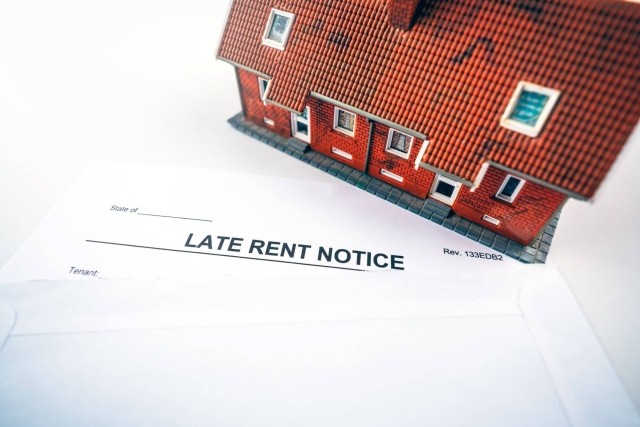There are several scenarios in which a landlord may want a tenant to move out of their rental property. Perhaps the tenant has stopped paying rent and any associated late fees, they’ve continuously damaged the property, or the landlord is selling the property (before the tenant’s lease is up) to buyers who intend to live there themselves. Whatever the reason, many landlords choose the “cash for keys” method to motivate tenants to move out.
What Is Cash for Keys?
Cash for keys is a method of getting a tenant to vacate a unit willingly by offering a cash incentive. For tenants who are struggling financially, cash for keys is an effective method for motivating them to leave, and will save you the time, money, stress, and effort that it takes to evict a tenant. Unfortunately, if the tenant is occupying a property without permission or has stayed in the unit past their end-of-lease date, the only legal way to force them out is to go through the formal eviction process. However, paying them to leave, especially if they agree to do so quickly and peacefully, will allow you to avoid the lengthy and expensive eviction process.
What Is the Formal Eviction Process?
When a tenant stops paying rent, a landlord generally has to follow a specific process if they want to have the tenant forcibly removed. Check with your state laws to see if there are any specifics in your area, but the eviction process usually goes as follows:
1. Proper notice
As the landlord, you must send proper notice to pay or quit to the tenant, meaning that the tenant has a certain number of days to either pay their rent balance in full or their lease will be terminated and they will be forced to move out of the property. The amount of notice required is determined by state law.
2. Lease termination
If the tenant fails to pay, the landlord can terminate the lease early after the notice period has expired.
3. File an eviction lawsuit
If the tenant refuses to vacate the property, the landlord must file an unlawful detainer action, commonly known as an eviction, with their local courthouse.
4. Win the judgment
The landlord must attend the hearing, state their case, and hope to convince the judge that the tenant is occupying the property without a legal right to do so, meaning that they have stopped paying rent or are living in the property without permission or past their end-of-lease date.
5. Hire local authorities
After the judgement is awarded (in favor of the landlord), the landlord can hire local authorities to remove the tenant from the property and oversee the removal of their personal property from the dwelling.
The eviction process takes about four to eight weeks, depending. That’s potentially two months of no rental income for the landlord, making this a stressful, time consuming, and expensive process. Although you could use the security deposit to cover the damage or unpaid rent, or even take the tenant to small claims court after the eviction, there’s no guarantee you’ll be able to collect the funds you are owed. Because of this, many landlords choose to go the route of “cash for keys.”
Illegal Options to Avoid
Although you may want your tenant to move out as soon as possible since they aren’t paying their rent or are damaging your property, there are some things you simply cannot do to get them to leave. You must follow federal and state laws when dealing with this serious situation. Locking your tenant out of the property or shutting off essential utilities is considered a “self-help eviction” and is illegal in every state, so don’t consider either of these methods. You cannot harass the tenant in any way, such as showing up unannounced or acting in any way unprofessional towards them. If you choose any of these illegal methods, be aware that you will likely be taken to court by the tenant and fined by the court. The tenant will then likely be allowed to live in the unit until you go through the proper eviction process.
How to Offer Cash for Keys
The options you’re left with if your tenant stops paying rent and refuses to leave is to give them incentive to leave voluntarily or go through the formal eviction process. To use the cash for keys method, try following this process:
1. State the facts
Either approach the tenant by phone or in person (with notice) and let them know that they can’t stay in the unit if they don’t pay rent. If this is a first-time situation or an honest mistake, simply send them an email to let them know their rent is late and they need to pay it (as well as a late fee, if appliable).
2. Describe the consequences of not paying or moving out
Calmly, but firmly, inform the tenant that you will have to file an eviction case, create a judgment against them, remove them from the property, and sue them for damages (if applicable). Make sure they are aware of the severity of the situation if they do not pay the balance in full or move out of the property.
3. Give the tenant a way out
Many people are struggling financially, so try to offer them a way out of this sticky situation. Give them a date you’d like them and their belongings to be out of the property and tell them you will give them a sum of cash to do so. This will allow them to avoid being taken to court and having their credit score lowered significantly.
4. Inspect the property
If the tenant agrees, it’s important that you show up to the property on the move-out date you agreed upon, inspect the property for cleanliness and any damage, collect the keys, and give the tenant the cash. Afterwards, immediately change the locks.
5. Withhold necessary funds from security deposit
Don’t return the tenant’s security deposit until after you complete a formal, thorough move-out inspection, check balances with the utilities (if in your name) and deduct for financial and material damage. As a landlord, you can withhold funds from the security deposit if it includes unpaid rent or property damage, among other things.
You may offer whatever amount you desire as a cash incentive, but try to be reasonable. After all, you’re losing money here as well since you’re no longer receiving income from your rental property. An eviction is pricey, so you’ll want to pay less than the average cost of an eviction when offering cash for keys, or else there won’t be any financial benefit to this option.
The Benefits of Offering Cash for Keys
Offering cash for keys is an effective method of motivating tenants to leave and will save you time and money in the end. Cash for keys will:
- Provide the tenant with the cash needed to move out or put a deposit down on a new place
- Give the tenant a last chance to get out of a sticky situation
- Motivate the tenant to move out sooner than if you go through the eviction process
- Allow you to find a new tenant and restore your rental income in days rather than months
Although it seems odd to offer a tenant money when they owe you money, remember that it is just business. Being a landlord is a job, and things don’t always go as planned. As a landlord, you need to cut your losses and focus on finding a new tenant. Before you accept your next application, properly screen your potential tenant(s) to ensure they are the right fit for you and your property. With Apartments.com, you can screen tenants online to view criminal and eviction history, credit reports, and more. Best of luck!











